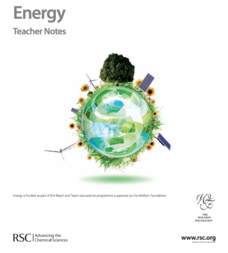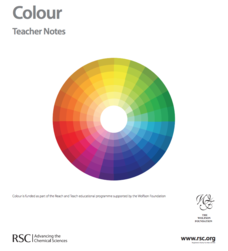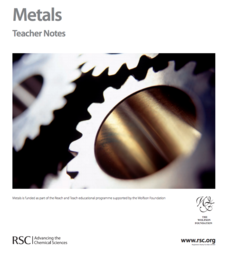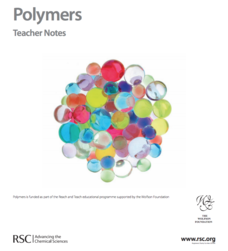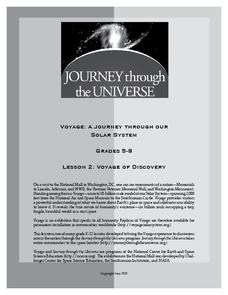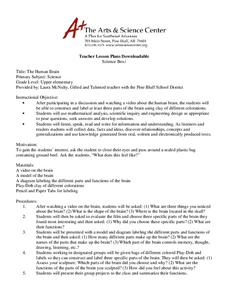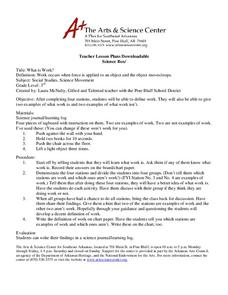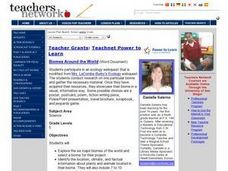Royal Society of Chemistry
Equilibria—Gifted and Talented Chemistry
Teaching is a balancing act! Keep things on an even keel with a comprehensive equilibrium lesson plan. The resource covers reversible and irreversible reactions, Le Chatelier's Principle, and the industrial applications of equilibrium...
Royal Society of Chemistry
Energy—Gifted and Talented Chemistry
What has more energy than a room full of pupils after a fire drill? This lesson plan! Explore the changes in energy during different chemical reactions, discover why some reactions feel cold and others feel hot, and tackle the concept of...
Royal Society of Chemistry
Colour—Gifted and Talented Chemistry
Add a splash of color to your chemistry class! Science scholars discover the principles behind color through a wide variety of hands-on activities. Lessons include dyes, chromatography, and flame tests.
Royal Society of Chemistry
Metals—Gifted and Talented Chemistry
Malleable, magnetic, mesmerizing metals! Pupils love learning about metallic elements, especially through the hands-on activities in an engaging lesson plan. The resource provides thorough instruction on the properties of metals, the...
Royal Society of Chemistry
Polymers—Gifted and Talented Chemistry
Polymers are an important part of our day-to-day lives, but how much do your pupils know about them? Learn the basics and beyond in a series of activities designed to build skills in observation, planning, organic chemistry, and bonding.
Odyssey of the Mind
Odyssey of the Mind Curriculum Activity: From a Distance
Challenge your class with an amazing set of ideas that really put the project back into project-based learning. It all starts with a whole class research task. Each learner will look up and take notes on multiple facets of things that...
Intel
Lights, Camera, Reaction!
Excite classes with a STEM project-based learning lesson covering chemical reactions. Groups study the different types through simulations and hands-on activities. They pick one type (synthesis, decomposition, single displacement, double...
Journey Through the Universe
Voyage of Discovery
Did you know that Pluto is smaller than the United States of America? It is difficult to conceptualize the size of planets and the distance between them, and the lesson addresses those exact issues. After a discussion, pupils create...
Curated OER
"N.A.S.A." Tower Structures Lesson Plan
Students, who are talented and gifted, create tower structure according to the given specifications that is able to support a tennis ball for 75 seconds but costs the least to build. They each design a tower in their journal but work in...
Curated OER
The Human Brain
Students identify parts of the human brain. In this biology lesson, students watch a video about the human brain. Students use different colors of clay to construct and label the three parts of the brain.
Curated OER
Global Warming and Hurricanes: Is an Increase in the Number of Stronger Hurricanes an Indicator of Global Warming
Ninth graders investigate whether stronger hurricanes are signs of global warming. For this environmental science lesson, 9th graders research both sides of the issue about global warming. They debate for or against this issue in class.
Curated OER
Revolutions in the Solar System
Third graders conduct research on the solar system. In this solar system lesson, 3rd graders will work in groups of four to create a power point presentation from their findings. They divide the research amongst the members in their...
Curated OER
Cell Reviews
Students draw cells, make a cell, and list organelles in plant and animal cells. In this cells lesson plan, students create edible cells.
Curated OER
Plant, Point and Record the Life Cycles of Plants
Students examine the life cycle of plants. Individually, they are given a digital camera in which they take pictures of plants in the various stages of the life cycle. To end the lesson, they plant their own flower bed in the classroom...
Curated OER
The Five Senses
Students explore their five senses. In this senses activity, students explore mystery boxes and use only one sense to determine what is inside the box. Examples of items in the mystery boxes include maracas, lemons, and cherry lotion.
Curated OER
Lungs: The Breathing Machine
Students create a model of the lungs and diaphragm. In this breathing activity, students create a model out of a plastic bottle and balloons. They see how the diaphragm helps to fill the lungs with air.
Curated OER
What is Work?
Third graders investigate the concept of force and work. In this physics lesson, 3rd graders visit four stations which include pushing the wall with your hand, holding books for ten seconds, pushing a chair, and lifting a light object....
Curated OER
Using Optical Illusion Brain Teasers Add a Twist to Math and Science
Optical illusion activities can provide a motivating way for students to explore math and science concepts.
Curated OER
Science Center Ideas for Students Who Finish Work Early
A science center can be a great way to extend the learning of students who finish their work early.
Curated OER
Where Did the Science Experiments Go?
Hands-on science experiments are essential for student learning.
Curated OER
The Strength of the Muscular System
Seventh graders investigate the strength of the muscular system. They explore voluntary and involuntary muscle movement and discuss the types of muscles: cardiac or heart, skeletal, and smooth. They visit stations to answer questions...
Curated OER
Electricity and Energy
Learners demonstrate that electricity can flow in a circuit. They demonstrate safe practices during lab investigations.
Curated OER
Biomes Around The World
Fifth graders explore the six major biomes found in the world and choose one for further research and presentation. Using internet sources, they identify the major characteristics of their biome and synthesize their information into a...
Curated OER
Reaction rates and Equilibrium
Students listen to a lecture on the collision theory. They discuss the reactant and product changes during a chemical reaction. Students are taught the factors affecting reaction rates. They complete a lab on entropy, heat and free...

